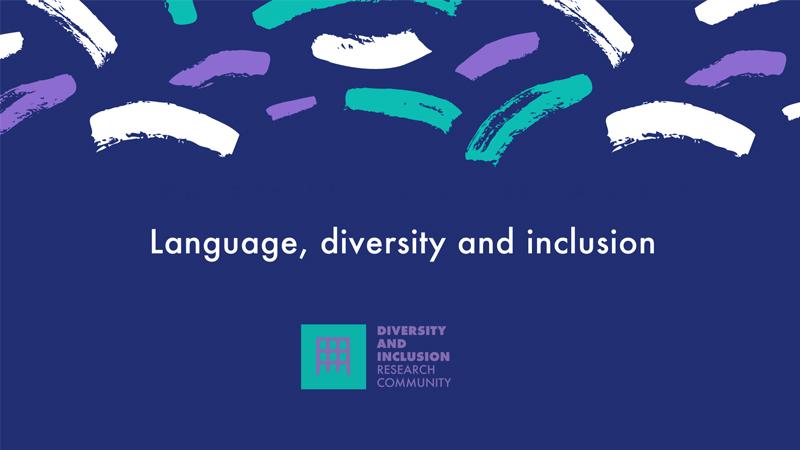The Diversity and Inclusion research community at the University of Westminster recently hosted a two-hour online event on Language, Diversity and Inclusion. Attended by over 50 participants including academics, professional services colleagues, students and external guests, the overarching theme was that language continues as a form of discrimination.

The research expertise and personal experiences of the contributing colleagues framed the event. This was followed by a panel discussion which included Andrew Linn, Head of College of Liberal Arts and Sciences. The speakers described how language and dialects have emerged and how these are used by individuals as well as governments to discriminate.
Jonathan Kasstan introduced the concept of ‘standard language’ and how this originates from discriminatory attitudes and dismissive behaviours. Kasstan argued that language subordination continues to legitimise the values and practices of mainstream society, devaluing non-conforming language varieties. The use of language subordination as a tool of discrimination was highlighted with examples as how this is used against women, endorsing systemic inequalities across society.
Gerda Wielander introduced the idea of the ‘lingua franca’ and focused on the use of Mandarin in the People’s Republic of China; both as a tool of inclusion and exclusion. The dominant language taught in schools in the PRC is Mandarin and lower levels of education lead to financial stratification and a lack of integration at all levels of society.
The concept of monolingualism as the first step to eradicating other languages was presented and how this leads to the marginalisation of particular groups was discussed. The danger of this, when endorsed by laws that propagate the notion of the quality of one culture over another, was described.
The value that educators and policy-makers place on language was presented by Terry Lamb. He described how more than half of all primary school children in inner London have English as a second language. This counters the argument that multilingualism does not exist in the UK. He also discussed how universities are also places of multilingualism, but the dominance of European languages means that these important assets remain widely unrecognised and undervalued. Lamb’s research into the ‘multilingual university’ challenges this.
Mykaell Riley took the virtual stage to present the concept of ‘twang’ in music. Riley spoke of the dynamic relationship Black musicians have had with language throughout history and the importance of accents as a focus of identity. Since Windrush, there has been a battle around the accent Black musicians use to market themselves.
Members of the Windrush generation often spoke a range of accents, each representing a part of their identity. Riley described the concept of ‘collective identity’ and how musicians have challenged the status quo and the relationship this has had to the marketing of their music.
Miriam Dwek, the Research Community Lead, said: “We will continue to raise awareness around language as a form of discrimination, and will host a follow-up workshop to develop these ideas to improve our own practice and to extend our research partnerships.”
Learn more about the Diversity and Inclusion research community.



